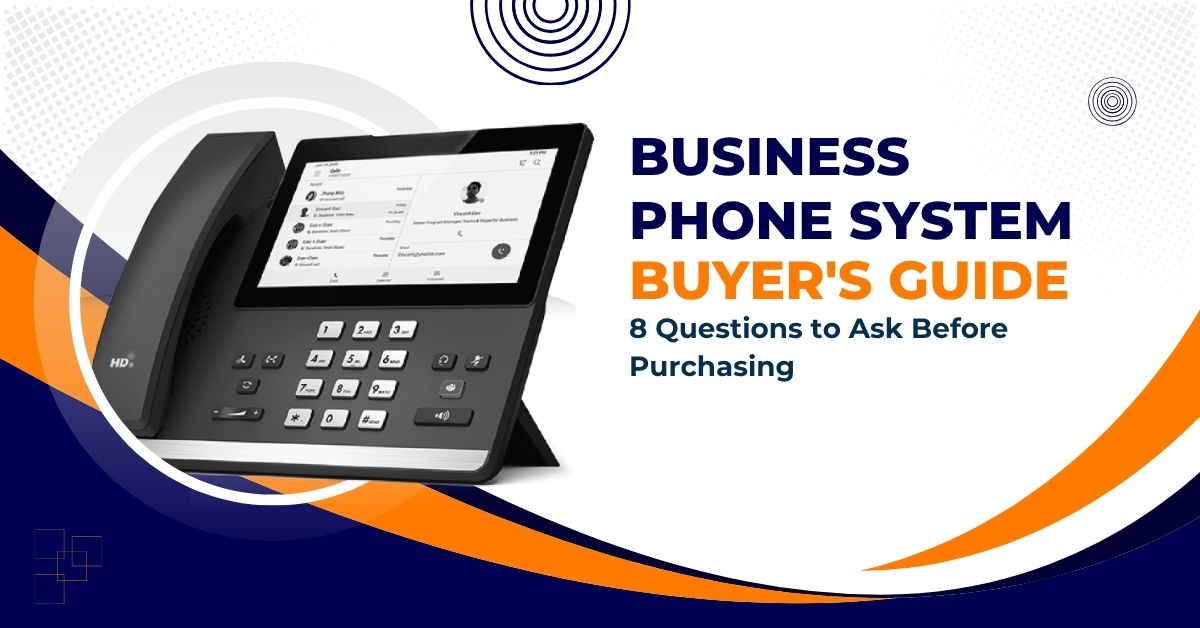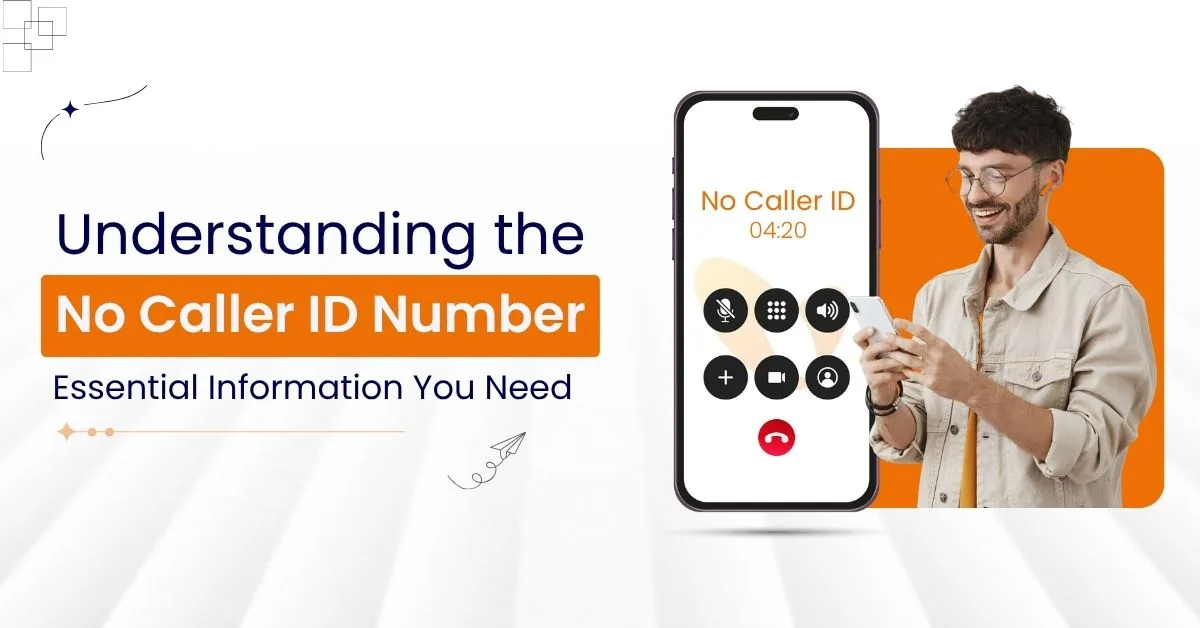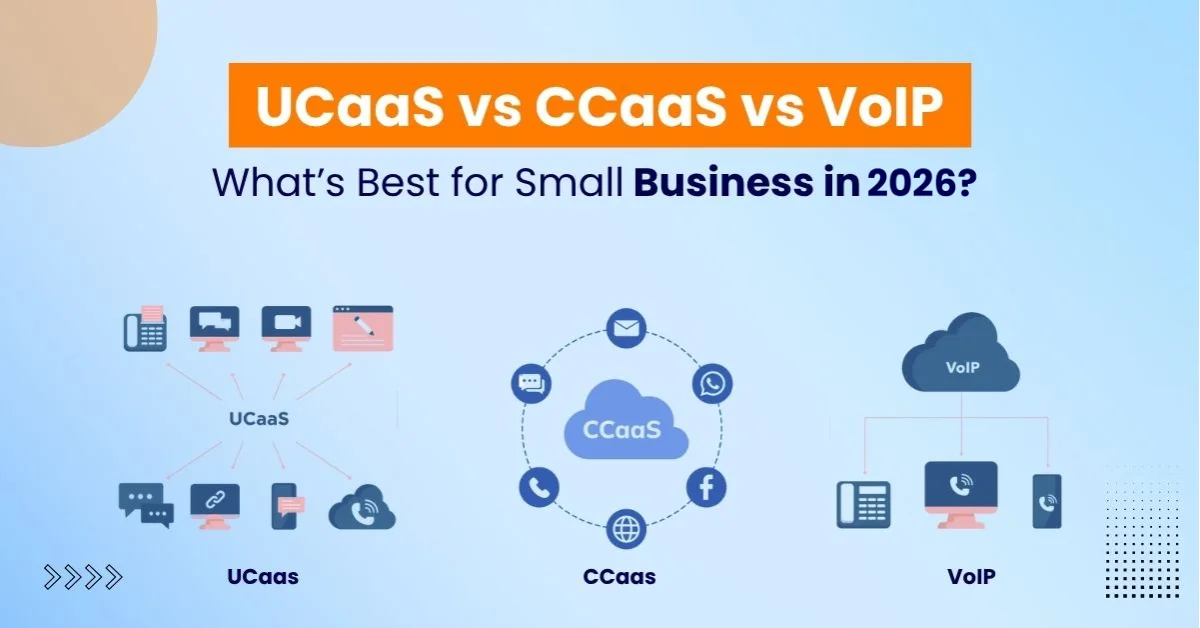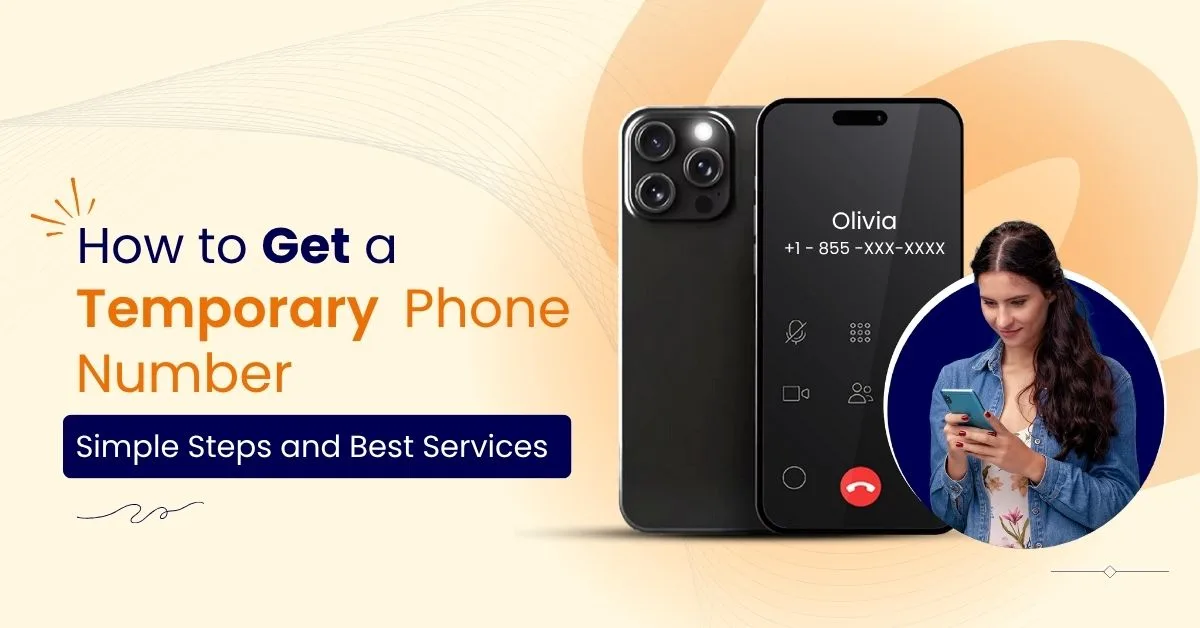Business Phone System Buyer’s Guide: 8 Questions to Ask Before Purchasing

4 min read
Table of Contents
Why Choosing the Right Business Phone System Matters
In today’s fast business world, staying connected with customers, suppliers, and workers is very important. Your business phone system is the hub that keeps your teams and clients in touch. Whether you like old landlines or new cloud-based VoIP systems, the right choice can help you work better, grow, and make customers happy.
This guide shows 8 key questions to ask before you buy a business phone system. Answering these helps you find the features and services that fit your business needs.
8 Essential Questions to Ask Before Buying a Business Phone System
1. What Types of Business Phone Numbers Are Included?
Phone systems offer different business numbers—local numbers, toll-free numbers, and vanity numbers. Ask if you can keep your current numbers to avoid confusing your customers. The right mix helps customers reach you easily and looks professional.
2. Can the System Scale with My Business?
Your phone system should grow with your business. Check how easy it is to add or remove users, lines, or features. Also, see if it works with many locations and more calls without extra fees. Scalability keeps your investment useful.
3. What Are the Total Costs Involved?
Know all costs upfront—hardware, setup, monthly fees, and charges for extra features like video conferencing or international calls. Ask for a full list to plan your budget and avoid surprises.
4. Does the System Support Multiple Devices and Remote Employees?
Make sure the system works on desk phones, mobiles, tablets, and softphone apps using Wi-Fi or internet. This helps remote work, improves teamwork, and keeps workers productive anywhere.
5. How Secure Is the Business Phone System?
Security protects your calls and data. Ask about encryption, firewall protection, following rules, and tools to block spam or scam calls. A safe system gives peace of mind to you and your customers.
6. What Features Are Included, and Which Cost Extra?
Look for basics like auto attendants, call recording, voicemail-to-email, unified communications, and CRM links. Know which features come free and which cost extra to avoid surprise bills.
7. How Reliable Is the Service?
Reliability matters. Check uptime guarantees (aim for 99.999% or more), disaster plans, and backup options like automatic call forwarding. These keep your phone line working during outages or problems.
8. What Customer Support and Training Are Provided?
Good support is key. Find providers who offer 24/7 help by phone, email, or chat. Also, check for onboarding, training, and self-help tools. Good support cuts downtime and helps your team use the system well.
Understanding Business Phone System Types
1. Traditional vs. Cloud-Based Phone Systems
Old PBX systems use on-site hardware and copper wires. They give steady voice calls but cost more and are less flexible. Cloud systems use VoIP tech, giving scalable, cheaper solutions that help remote teams and many communication channels. Cloud systems offer easy online control, auto call routing, and features like caller ID and voicemail-to-email.
Cloud systems cut hardware costs and keep calls going with auto forwarding and failover. Hybrid systems mix old PBX hardware with cloud VoIP features. This balances steady service with new features. Choose based on your business size, budget, and needs.
2. Hybrid Systems
Hybrid systems mix cloud and old features. They send calls through both to get the best performance and control costs. This fits businesses that want old PBX reliability plus cloud flexibility and new features. It helps smooth call transfers and steady voice calls.
Additional Considerations When Choosing a Business Phone System
1. Integration with Existing Tools
Make sure your phone system works well with your current software, like CRM, email, and team apps such as Microsoft Outlook and Google Workspace. Integration makes work easier, improves customer care, and boosts worker productivity by putting communication and data in one place.
2. Call Volume and Usage Patterns
Look at your usual call volume and how you communicate. Pick features that fit your needs. For many calls, choose systems with call queues, ring groups, and auto attendants to handle calls well. Unlimited calling plans help avoid extra fees and keep customer calls smooth during busy times.
3. Mobility and Remote Access
Pick systems that work on mobile devices and softphones. This lets your team work anywhere. Tools like screen sharing, video meetings, and audio conferencing help teams work well across locations. This makes it easy to stay connected and productive no matter where you are.
Conclusion: Make an Informed Choice for Your Business Phone System
Choosing the right business phone system is key for good communication, happy customers, and business growth. Use these eight questions to check providers and find a fit for your needs, budget, and future plans. A good system boosts worker productivity, supports many communication channels, and gives a smooth customer experience.
Ready to upgrade your business phone system?
Frequently Asked Questions (FAQs)
1. Can I keep my existing business phone numbers when switching systems?
Yes, most providers let you keep your numbers without problems. This keeps things easy for your customers.
2. What is the difference between VoIP and traditional phone systems?
VoIP uses the internet for calls. It gives more flexibility, scale, and often lower costs than old PBX systems that use phone lines.
3. How important is uptime for a business phone system?
Very important. High uptime (99.999% or more) means your system is steady. You miss fewer calls and keep customers happy.
4. Are cloud-based business phone systems secure?
Yes, good cloud providers use encryption, firewalls, and follow security rules. This keeps your calls and data safe from hackers.
5. Do business phone systems support remote work?
Modern systems work on many devices and internet types. They help remote workers stay connected easily with mobile phones, softphones, and cloud tools.
6. What advanced features should I look for in a business phone system?
Look for call routing, automated prompts, video conferencing, audio conferencing, call recording, voicemail-to-email, and CRM and business tool links. These improve communication and work.
7. How does a virtual phone system benefit my small business?
Virtual phone systems let your team get calls on many devices, like cell phones and computers. This gives flexibility and helps spread-out teams without extra hardware.
8. Are there extra costs or fees I should be aware of?
Some providers charge extra for add-ons, international calls, or advanced features. Always ask for a full cost list to avoid surprises.
9. How easy is it to add or remove users as my business changes?
Cloud-hosted systems let you quickly add or remove users and features online. This helps your business grow or shrink with no trouble.
10. What kind of customer support and training can I expect?
Look for providers with 24/7 support by phone, email, or chat. They should offer onboarding help, training sessions, and self-help tools like tutorials and FAQs. This helps your team use the system well.
Published: October 28th, 2025
Subscribe to Our Latest Updates
Get monthly product and feature updates, the latest industry news, and more!





